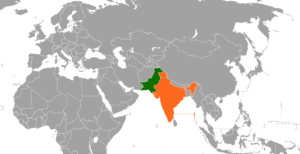India’s Billionaire Wealth Is On Display As Nation Votes

Sonali Kolhatkar
04-28-2024 ~ India’s Ambani family has enjoyed flaunting its obscene wealth, a perfect reminder in the midst of an election, of the economic inequality afflicting voters.
There are several exercises in extremes playing out in India right now. Nearly a billion people are voting in elections that will last into early June, braving record-high temperatures to cast ballots. Against this backdrop, Asia’s richest man, Mukesh Ambani, is throwing what will likely be the world’s most expensive wedding for his youngest son.
Although they appear unrelated, these phenomena are intimately linked.
With 1.4 billion people, India now has the largest population of any nation in the world, surpassing China in 2023. It is also the world’s largest democracy, a title it has held since the end of British colonial rule in 1947. India’s secular democracy has eroded, particularly since 2014 when the Bharatiya Janata Party (BJP)’s leadership ushered in a dawn of Hindu supremacy in a nation that is home to many different faiths.
Much like the Christian right in the United States blended religious fervor with capitalist fundamentalism, the BJP has cloaked its pro-business position in saffron robes. And, just as American billionaires embrace the white supremacist Donald Trump, India’s wealthy seem unperturbed by incumbent Prime Minister Narendra Modi’s hate-filled speeches. Read more
How Banks And Investors Are Fueling A Global Biodiversity Crisis

Laurel Sutherlin ~ Rainforest Action Network
04-28-2024 ~ Commercial financial flows to the forest-risk commodity sectors are driving the majority of tropical deforestation.
In a global context where tropical rainforests play a critical role in biodiversity conservation and climate regulation, these ecosystems are severely threatened by expanding agribusiness and logging activities. This poses significant risks to the environment, wildlife, and communities dependent on rainforests.
Against the backdrop of escalating climate change impacts, urgent action is needed to prevent the collapse of these vital ecosystems and address the injustices faced by Indigenous and local communities and workers within the agricultural sector.
The ratification of the UN Global Biodiversity Framework in December 2022 marked a pivotal moment, signaling a collective commitment by 196 countries to reverse the decline in global biodiversity. However, financial institutions have historically failed to address their role in exacerbating the biodiversity crisis.
A 2023 report by Forests and Finance—a coalition of campaign, grassroots and research organizations that includes TuK Indonesia, Profundo, Amazon Watch, Repórter Brasil, BankTrack, Sahabat Alam Malaysia, Friends of the Earth U.S., and my organization, Rainforest Action Network—sheds light on the extensive financial support provided to sectors responsible for tropical deforestation, including beef, palm oil, pulp and paper, rubber, soy, and timber. “From January 2016 to September 2023, banks provided at least $307 billion in credit to these operations,” states the report, while institutional investors held approximately $38 billion in related shares and bonds. Read more
What Does Play Tell Us About Human Evolution?

Brenna R. Hassett
04-26-2024 ~ Our species devotes a singular amount of time to an utterly unserious aspect of life: play. This begs the question: what is the adaptive value of horsing around? What possible evolutionary benefit could an activity that sees no specific return possibly have that we devote so much time to it?
Play holds a particularly special position in the study of both human and non-human behavior; it is accepted as a near-universal part of many animals’ lives, but a definition for ‘play’ that covers species from birds to bats is elusive. What holds together the mock-fighting of puppies and the rhyming chants of our own children, however, is a definition of play that says it is not for any specific purpose; it’s a set of actions that don’t quite achieve anything that an animal repeats during certain phases of their life when they are relaxed and not under threat. Three separate types of play are usually distinguished: play with objects, with locomotor skills, and with friends. The critical thing that separates these types of activities from others, whether undertaken by a cow or a crow, is that they are fun.
It does not, in a strictly Darwinian sense, make any sense for animals to play unless play itself has some adaptive value. Time spent in play is not spent acquiring food or sleeping, for instance, and bouncing around unnecessarily in play burns calories that could be used for growth or survival. And yet, a huge number of animal species have been observed ‘playing’: monitor lizards like the giant Komodo dragon will chew and fetch objects like a dog, fish will chase balls, and octopuses will explore Lego. Play is most at home, however, in mammals, and nowhere is it more obvious than in our own species.
There has been a great deal of argument in evolutionary biology and evolutionary psychology about what that adaptive value might be. Hypotheses include play in animals as physical training, allowing immature individuals to ‘practice’ pounces or perches that they will need as adults. The theory dating back to Victorian times that play is in fact a serious business that serves to train adult minds is still quite prominent, as can be seen by the vast array of ‘educational’ toys available. What these approaches have in common is that they see play as purposeful, as a kind of training mechanism. In this framing, juvenile play serves to make a fully competent adult, of whatever species.
It is clear that play does help train some animals to survive and thrive. A study of bear cubs found the cubs that played more had better survival rates; cheetah cubs that spent more time pretending to stalk their family also did more stalking of prey. There is a vast body of research on the way that play prepares human children for their lives as adults, and in fact our species spends a proportionately longer amount of time on the most playful period of our lives, childhood, than any other. So, while we know that humans engage in locomotor, object, and social play, what we need to understand is why it is adaptive for our species to spend so much time doing it.
One of the ways to do this is to look at how play works in closely related animals. Play does not behave like some sort of directly inherited Mendelian trait; play is deployed very differently even among relatively closely related species. Compare two of the great apes that, to the untrained eye, seem very similar: bonobos and chimpanzees. Both are great ape species of similar size and morphology, but they last shared an ancestor 1 to 2 million years ago and today are separated by the Congo River. Their social systems are very different, with male-dominated hierarchies in the chimpanzees and more fluid and female-led social groups in bonobos. They also occupy different environmental niches, with more reliance on seasonal fruit by bonobos and more access to year-round foods, including plants and insects, by chimpanzees. These may relate to differences in the skills they need to eat: chimpanzees make and use tools such as termite ‘fishing rods’ while bonobos have never been seen to do so.
One difference is in the amount and time the species spend in play. Bonobos are inveterate players throughout their lifetimes, whereas chimpanzees tend to limit play to infancy and childhood. The type of play chimpanzees and bonobos enjoy is also different. Young chimpanzees, who will grow up to become tool users, do more ‘object’ based play than young bonobos. Young bonobos however, who rely more on cooperation to organize their adult societies, will spend more time in ‘social’ play. Play also results in different outcomes for the two species: juvenile chimp play fights often escalate into real fights, while this almost never happens in bonobos.
Perhaps one of the most critical differences in the way these two species play is that in bonobos, play carries on throughout the animals’ lives. Chimpanzees, as they get older, have less and less tolerance for these kinds of interactions, while bonobos retain a kind of childlike tolerance for some kinds of play throughout their lives. That not all species give up on play as adults suggests that there is more to play than just training—adults, after all, are supposed to be fully trained. This is something that we can recognize in our own species: human adults are also champions at playing; whether it is sports, video games, dramas, or any other sort of activity that meets the not-quite-functional-but-fun definition of play.
Adult play tends to be social and to happen in species where social relationships are complicated and require a lot of finesse to manage. Playful interactions, particularly play fighting, help less-dominant adults test the boundaries of their relationships with more dominant ones, reinforce social bonds, and generally maintain the social organization of the group. This kind of adult play encourages cooperation and tolerance, and may even support collective decision-making.
We can look at the evolutionary commitment to play that our species has made in two parts, then. Our long childhoods give us a great deal of opportunity to ‘train’ through play—to gain competence in locomotor, object manipulation, and social skills. We are certainly not the only species to do this, nor are we very unique among our closest relatives: we like to play with tools, just like chimpanzees, because we are also a tool-using species, and we engage in all sorts of social play like bonobos. For us humans, our long childhoods give us a chance to play longer—but perhaps what most stands out is our ability to carry on this childlike willingness to take things a bit less seriously into adulthood. Our dedication to play throughout our lives, then, may be precisely the mechanism that allowed us to evolve to survive with less rigid social hierarchies and more cooperative social groups.
By Brenna R. Hassett
Author Bio: Brenna R. Hassett, PhD, is a biological anthropologist and archaeologist at the University of Central Lancashire and a scientific associate at the Natural History Museum, London. In addition to researching the effects of changing human lifestyles on the human skeleton and teeth in the past, she writes for a more general audience about evolution and archaeology, including the Times (UK) top 10 science book of 2016 Built on Bones: 15,000 Years of Urban Life and Death, and her most recent book, Growing Up Human: The Evolution of Childhood. She is also a co-founder of TrowelBlazers, an activist archive celebrating the achievements of women in the “digging” sciences.
Source: Human Bridges
Credit Line: This article was produced by Human Bridges.
Modi Could Squander An Unprecedented Chance At Normalizing India-Pakistan Ties

Map: wikipedia.org
04-26-2024 ~ Mired in economic and internal crises, Pakistan is primed for normalization and trade with India—but Narendra Modi’s Hindu nationalist government is failing to seize the chance.
When Narendra Modi returned to power for a second term in India with a landslide victory in 2019, his government acted swiftly. Just months after the election, the Modi government abrogated Article 370 of the Constitution of India. In doing so, it stripped the special constitutional status conferred on Jammu and Kashmir, India’s only Muslim-majority state, and downgraded its status from a state with its own elected assembly to a union territory administered by the central government in Delhi. The move disrupted the tremulous status quo that India and Pakistan had been holding on to in Kashmir for decades: India demanding that Pakistan withdraw from the north and west of Kashmir, which are under Pakistan’s administration, and Pakistan demanding a referendum to determine who administers the whole territory, with both parties holding steadfastly to the Line of Control. Angered by the Modi government’s move, Pakistan retaliated by suspending trade ties with India.
Until recently, Pakistan’s position vis-à-vis India emphasized a resolution to the Kashmir issue as a prior step to movement on any other matters. Now, with Pakistan in a dire economic crisis, no prospects of a softened stance from India, and a possible third term as prime minister for Modi after India’s looming general election, Pakistan might be forced to seek a resumption of trade ties while putting Kashmir on the backburner.
Ever since Modi became India’s prime minister in 2014, there has always been anticipation in Pakistan—heightened during each Indian election season—that the Modi government will mobilize anti-Pakistan rhetoric to energize its base. In April 2019, at a campaign rally in Rajasthan before the last general election, Modi announced his readiness to use India’s nuclear weapons against Pakistan. “Have we kept our nuclear bomb for Diwali?” he asked the crowd. Pakistan immediately denounced the remarks as “highly unfortunate and irresponsible” and a foreign office spokesperson called out Modi’s use of such “rhetoric for short-term political and electoral gains, with complete disregard to its effects on strategic stability in South Asia,” rightly deeming it “regrettable and against norms of responsible nuclear behavior.”
Modi deployed similar hyperbole while talking about a cross-border commando operation in 2016 and an air raid on Pakistan’s territory in early 2019 that New Delhi claimed to have conducted in retaliation for militant attacks on the Indian military in Jammu and Kashmir. The discussion around these operations, which Modi called “surgical strikes,” had more political significance in India than actual military significance between India and Pakistan. By now they have even become the subjects of Bollywood movies, making them part of popular discourse in Modi’s favor.
Just this month, the Guardian reported that intelligence officials from both countries had alleged that India had a policy of targeting terrorists on foreign soil, with 20 individuals killed in Pakistan since 2020. While India denied the report, its defense minister, Rajnath Singh, said that if “any terrorist will try to disturb India from Pakistan, we will give muh tod jawaab” (“a jaw-shattering answer”). He added, “If needed, Pakistan mein ghus ke maarenge” (“If needed, we will infiltrate Pakistan and kill them”). Coming into another election season, Singh was repeating Modi’s tough-on-terror rhetoric from the “surgical strikes” in 2019. In Pakistan, the report escalated fears over Indian conduct, further weakening the prospects of a normalization of ties between India and Pakistan—something that would entail a demilitarization around Kashmir, an end to cross-border support for militancy by both countries and greater exchanges between Indians and Pakistanis via relaxed visa regimes as well as increased trade and cooperation. Read more
Raising Hairless Primates
 04-24-2024 ~ I remember the first time I observed my daughter pointing. We were at a neighborhood playgroup, a daily gathering of toddlers and their parents, and 12-month-old Tessa pointed at a painting of a koala on the wall. I marveled at her, almost yipping with joy. In the days and weeks that followed she pointed with growing frequency at things that interested her, and, more importantly, things she wanted to share with me. And every time she did this, I looked at her in astonishment. The other parents thought I was nuts.
04-24-2024 ~ I remember the first time I observed my daughter pointing. We were at a neighborhood playgroup, a daily gathering of toddlers and their parents, and 12-month-old Tessa pointed at a painting of a koala on the wall. I marveled at her, almost yipping with joy. In the days and weeks that followed she pointed with growing frequency at things that interested her, and, more importantly, things she wanted to share with me. And every time she did this, I looked at her in astonishment. The other parents thought I was nuts.
Earlier in my life, I was a primatologist—I studied behavior and communication in capuchin monkeys, chimpanzees, and bonobos (the latter a relative of the chimpanzee, but a distinct species with very different behavioral characteristics). I eventually specialized in gestural and multimodal communication in great apes. Great apes have more cortical control over their hands than other primates, and they use their hands to gesture to one another. In addition to gestures, apes use facial expressions and vocalizations to communicate, and sometimes they use all three modalities simultaneously (as humans do)—hence the term “multimodal communication.”
One thing I always looked for while gathering my data was pointing; it was rare among the socially housed, outdoor-living chimps I studied, and the handful of times I observed it, it was a big deal. To be sure, chimps have other ways to signal to each other what they want, but pointing with their index fingers isn’t usually one of them. When I saw this very common behavior develop in my own child, my appreciation deepened for just how complex (and social) human cognition is.
Primatologists study our closest living relatives for a variety of reasons—to intrinsically understand more about their lives (diet, habitat, mating patterns, genetics), to understand how they interact with their environments, and to shed light on what our last common ancestor with the apes might have been like. One of the enduring mysteries of human evolution is how much of our behavior and cognition is uniquely human and how much can be found in living primate species. This was my research focus.
When I stared in amazement as my daughter pointed to the koala painting while looking at me, what the other parents didn’t know was that I was marveling at how often human toddlers point, and referentially point, at that—meaning children point to share attention, not just to obtain things. The distinction is known as declarative vs. imperative pointing—“Hey Mom, look at that cool thing over there!” as opposed to “Give me that piece of candy on the shelf.” Pointing is considered a hallmark of communication, language development, and joint attention (when one individual wants another to pay attention to the same thing she is looking at), and neurotypical toddlers do it all the time (the absence of pointing is a marker for autism).
In addition to my daughter Tessa, I have a son, Eli, who is two years younger than her. Like all siblings, they are obsessed with fairness (I don’t believe any parent who says their kids aren’t). If one kid gets a cookie that’s even a millimeter bigger than the other’s, all hell breaks loose. You can try all you want to justify to them why one cookie is bigger, but the kids aren’t having it. We tend to think this focus on fairness is uniquely human, but my lab colleague Sarah Brosnan and our PhD advisor Frans de Waal corrected this notion 20 years ago in a landmark study aptly named “Capuchins Reject Unequal Pay.” In this study, two brown capuchins (highly intelligent South American monkeys) worked side by side on a token exchange task. As a reward, each received a cucumber slice. When the monkeys received the same reward for the same work, all was peaceful. That peace was quickly disrupted when one received a grape (more desirable than the cucumber) and the other still got the cucumber. After being perfectly happy with a cucumber, once the monkey saw the other one’s grape, he lost it; he literally threw it out of his enclosure with what I freely admit is an anthropomorphized sense of indignance. Capuchins reject unequal pay indeed.
When I see my children argue over the fact that one’s backpack is taking up an inch more space on his side of the car than the other’s, I try to remember that this is evolutionarily ancient behavior, one that ensures that cooperation is beneficial to our species. Why do we care if someone gets more than we do, all other things being equal? In the long term, if we feel assured that everyone is putting in equal amounts of work for similar pay, we’re more willing to cooperate. I tell this to my kids, but for some reason, they don’t act like rational beings and bicker less. But when they figure out that cooperating nets them big payoffs (such as stepping on each other’s shoulders to reach the candy I thought I’d so cleverly hidden), they’re my shining examples of evolutionary continuity. I couldn’t be more proud.
Viewing my children through primatological glasses provides me with an ongoing perspective on raising them. When they have tantrums, argue over the last slice of cake, or try to get my attention through gestures, those glasses enable me to take a step back and recognize a broader purpose (I hope!) of their behavior. And this perspective also helps me feel another layer of connection. Remembering that we’re all one big primate family makes the wilds of human parenting a little more manageable—and fun.
By Amy Pollick
Author Bio: Amy Pollick received her PhD in animal behavior from Emory University, working with Frans de Waal on gestural and multimodal communication in great apes. She is a former director of government relations for the Association for Psychological Science, and she has taught at Gallaudet University. She lives in Washington, D.C.
Source: Human Bridges
Credit Line: This article was produced by Human Bridges.
Senator Cardin Must Help End The Blockade Of Cuba
 04-22-2024 ~ Cuba is going hungry. The costs of food and other basic necessities are skyrocketing. Rolling blackouts periodically plunge the island into darkness. Parents struggle to find milk for their children.
04-22-2024 ~ Cuba is going hungry. The costs of food and other basic necessities are skyrocketing. Rolling blackouts periodically plunge the island into darkness. Parents struggle to find milk for their children.
For the first time in history, the government has asked the UN for food aid.
The people of Cuba are facing their worst humanitarian crisis in decades. But Maryland Senator Ben Cardin has the power to help. We, as faith leaders concerned for our siblings in Cuba, urge him to act.
When President Obama took office, he recognized that U.S.-Cuba policy needed a change. For over half a century, the powerful United States has imposed a strict embargo (considered by many to be a blockade) on the small island nation. The main consequence of this policy has been the suffering of everyday Cubans. A fettered economy, deteriorating infrastructure, lack of access to food and medicine—the costs of the blockade are borne by the entire Cuban people.
President Obama began a process of easing these harsh restrictions and thawing relations between our two nations. The people of Cuba were overjoyed; for once, their future looked bright.
Then came President Trump. In short order, Trump undid virtually all of the progress that Obama had made. In his last week in office, Trump even added Cuba to the State Sponsors of Terrorism list, a designation that top Democrat and Republican officials have called “bogus” and “a fiction,” and that effectively cuts investment-starved Cuba off from the international financial system.
When Biden became president, hopes of a return to the Obama approach were rekindled. After all, Biden had been Vice President at a time when easing restrictions yielded immediate benefits for Cuban civilians while winning the support of U.S. voters. But instead, Biden has kept almost all of the Trump policies in place, and the Cuban people are now paying the price.
The combination of the COVID-19 pandemic and Trump’s sanctions has ignited such a crisis that over 4 percent of the Cuban population has left the country in search of a better life in the United States in the past two years alone.
U.S.-Cuba policy is stuck in the Trump era. But as Senator Cardin prepares to retire, he has a chance to chart a new path.
Last year, Cardin assumed the powerful position of Chair of the Senate Foreign Relations Committee, taking over from the hardline pro-blockade New Jersey Senator Bob Menendez, who had to step down after being indicted on bribery-related charges.
That’s why we recently joined over thirty Maryland-based organizations, and dozens of community leaders, in sending a letter urging Senator Cardin to help end the blockade. As Senator Menendez used his position to block any measure of relief for the Cuban people, Senator Cardin can promote reform, supporting and advancing legislative efforts such as those that would repeal the Torricelli and Helms-Burton acts, and could wield his role to pressure Biden to take unilateral action, such as removing Cuba from the State Sponsors of Terrorism list.
Uniting churches, immigrant rights organizations, University of Maryland academics, Young Democrat clubs, and over a dozen ordained ministers and rabbis, we wrote: “As you are soon to depart from Congress, your actions in the coming year may define how you are remembered. It is our hope that your legacy will be as someone who is willing to transcend the inertia of the status quo and do what is right; for the people of Cuba, the United States, and the world.”
This is not a fringe demand. As our letter notes, poll after poll after poll show that most Democrats and Republicans alike support an end to the blockade. That’s to say nothing of the rest of the world; last year, the United Nations General Assembly voted to condemn the blockade by a vote 187 to 2. It was the 31st time the resolution has passed nearly unanimously.
Whatever we may make of the Cuban government, and whatever share of the responsibility it holds for the state of the Cuban economy, nothing justifies the United States intentionally starving the Cuban people. Our faiths demand that we stand up to such injustice, and build a world that respects the inherent dignity of all people.
Senator Cardin has a window of opportunity to help right a historic wrong, ease the suffering of millions, and define his legacy as a true forward-thinking leader. But that window is closing fast. It’s time for him to act.
By Rev. Deborah McEachran and Rev. Dr. Eliezer Valentín-Castañón
Author Bios:
Rev. Deborah McEachran is Pastor of the Hunting Ridge Presbyterian Church in Baltimore.
Rev. Dr. Eliezer Valentín-Castañón is the Frederick District Superintendent of the United Methodist Church’s Baltimore-Washington Conference.
Source: Independent Media Institute
Credit Line: This article was produced by Economy for All, a project of the Independent Media Institute.


